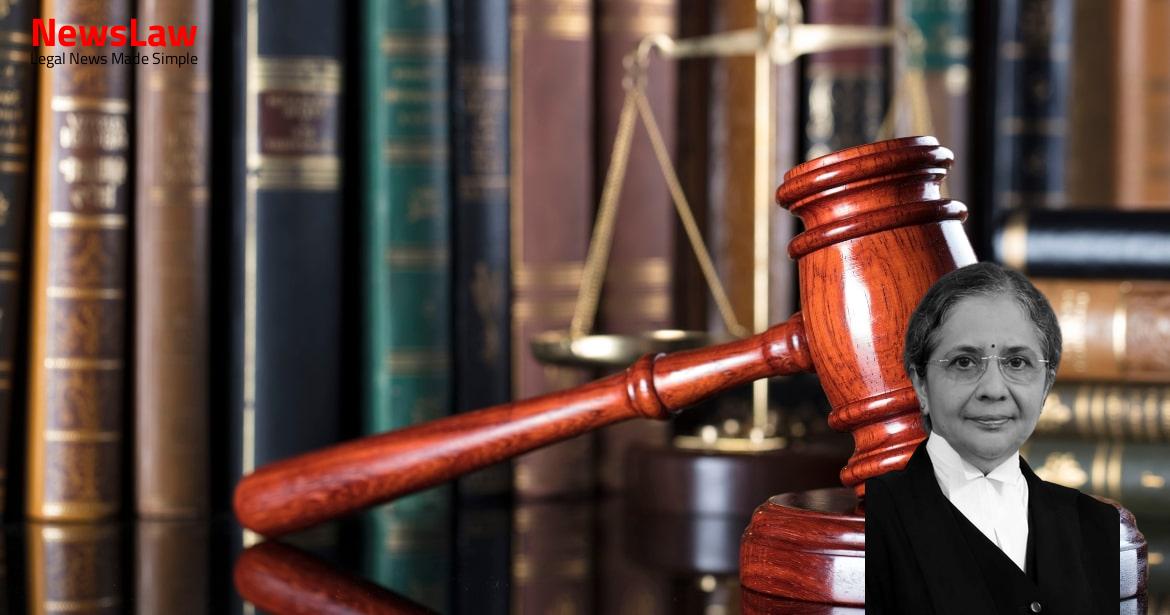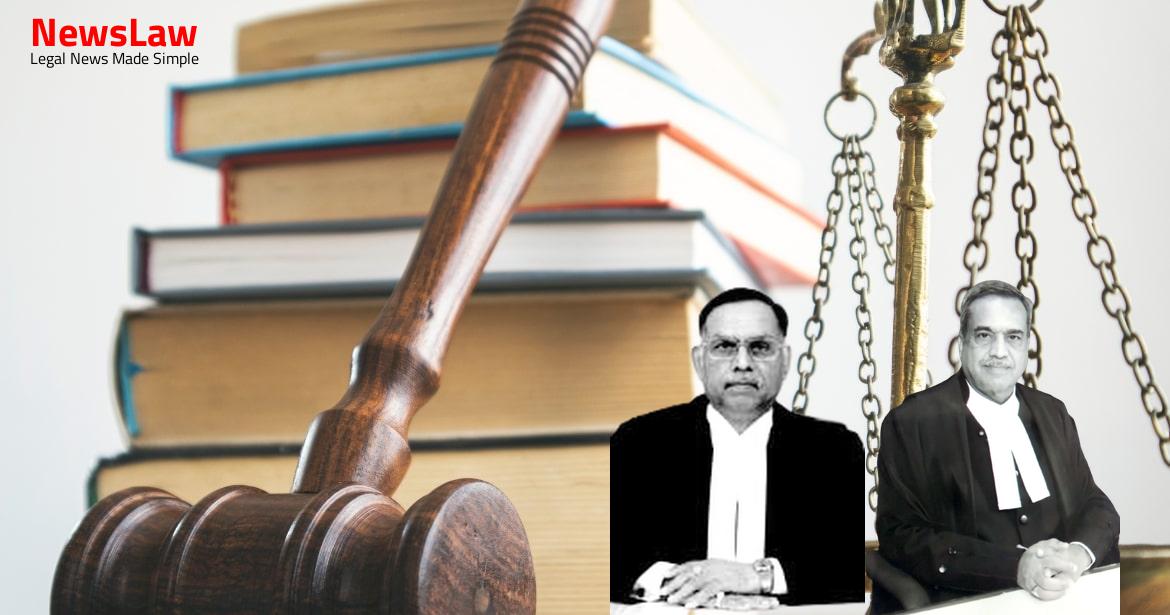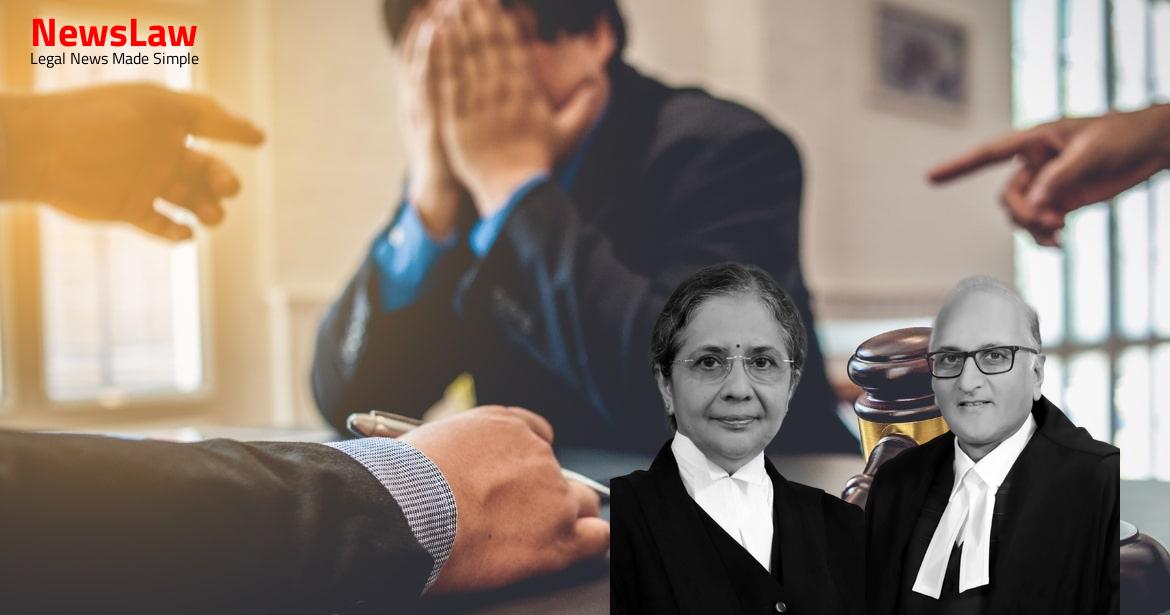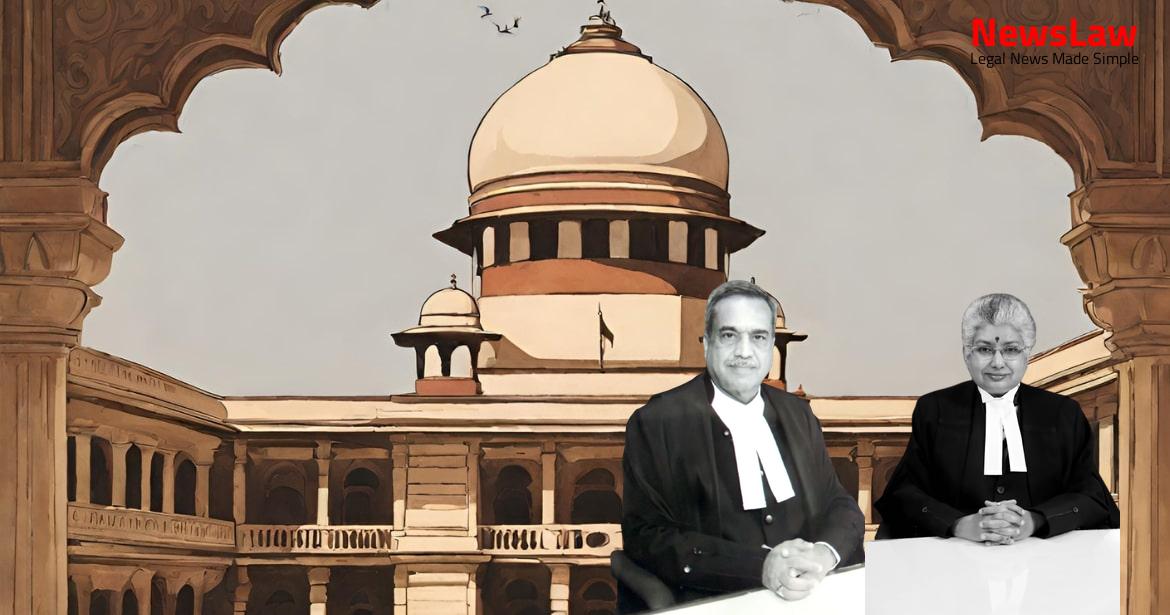In a landmark judgement by the Supreme Court of India, the case of Bhagwan Singh vs. Sukh Pal Singh has seen justice being served. This case highlights the importance of upholding legal ethics and maintaining the integrity of the judicial system. Stay tuned for more details on this significant legal victory.
Facts
- The Court directed the Notary Mr. A. N. Singh to remain present on the next date of hearing.
- Mr. Sukhpal Singh and Ms. Rinki were directed to be impleaded as party respondent nos. 3 and 4.
- The original record of the Application under Section 482 No. 41533/2019 was to be called from the Allahabad High Court.
- Two appeals were sought to be filed in the name of the appellant- Bhagwan Singh.
- Sukhpal handed over a Vakalatnama to Mr. Karan Singh for arguing in recall application No 3/2020 in the Allahabad High Court.
- The 1st recall application No. 3/2020 was rejected by the Hon’ble Court of Judicature at Allahabad.
- The applications bearing No. 7/2020 and 8/2021 were not pressed by the Ld. Advocate.
- After the dismissal of Recall application No. 3 of 2020, Victim/Rinki wanted to file a Special leave petition before the Hon’ble Apex Court.
- Ms. Rinki, daughter of Bhagwan Singh and wife of Sukhpal Singh, was directed to be present in court on the next date of hearing.
- Mr. Sukh Pal made inconsistent statements regarding meeting his father-in-law, Bhagwan Singh.
- Bhagwan Singh denied meeting his daughter or son-in-law since 2013.
- Advocate on Record, Mr. Anubhav Yadav submitted documents with Bhagwan Singh’s signatures.
- There was a discrepancy regarding the filing of the SLP in Bhagwan Singh’s name.
- Notary Mr. A.N. Singh mistakenly attested an affidavit of Bhagwan Singh without his presence.
- Bhagwan Singh’s daughter stated she had frequent phone conversations with him.
Also Read: Landmark Judgement in the Case of Money Laundering Offenses
Arguments
- The petitioner, Bhagwan Singh, denies having any contact with his daughter, Rinki, or son-in-law, Sukh Pal, since 2013.
- He refutes the statement made by his daughter and states that he had not met them or had any telephonic contact.
- An AOR, Mr. Anubhav, apologizes for certifying the petitioner’s signature without his presence.
- Mr. Sukh Pal supports his wife’s statement about meeting Bhagwan Singh and receiving the vakalatnama.
- There are discrepancies in the documentation process, with signatures being identified in the absence of the petitioner.
- The Notary, Mr. A.N. Singh, admits to attesting documents without the petitioner’s presence.
- Petitioner affirms that he did not sign the vakalatnama or authorize the SLP filing.
- The involvement of Notary and Advocates is highlighted in notarizing and representing the petitioner.
- The history of the case involving Nitish Katara and false implications is discussed.
- Additional details are provided about the witness’s role in the Nitish Katara case and the pressures faced.
- Before the case, Ajay Katara was leading an ordinary life.
- After becoming a witness in Nitish Katara’s murder case, he faced multiple legal cases.
- Despite not having any prior legal issues, he has been targeted with false cases, including multiple cases under section 376 IPC.
- He has been named as an accused in around thirty-seven cases due to the influence of the powerful Yadav family and their associates.
Also Read: Case of Vetrivel vs. State: Upholding Legal Integrity and Swift Justice
Analysis
- The Notice only permits the Advocate-On-Record to mark the appearances of the Advocates appearing in the Court.
- Advocates who are not present in the Court should not be permitted to mark their presence to avoid adverse impacts on Bar members who appear regularly.
- Every Advocate’s appearance is a crucial role for preserving the independence of justice and the democratic setup of the country.
- Instances of professional misconduct are on the rise, leading to the erosion of ethical values and degradation of professional ethics.
- Creating false documents, implicating someone falsely, and withholding information are offenses punishable under the Bhartiya Nyaya Sanhita, 2023.
- Full and correct disclosure of material facts is expected from parties approaching the court seeking justice.
- Advocates are officers of the court and expected to assist the court fairly in administering justice.
- Advocates should conform to the Rules of Conduct and Etiquettes to maintain professionalism.
- Advocates’ misconduct can have adverse effects on those wrongfully implicated and the judicial system.
- Witnesses play a vital role in facilitating the court to arrive at correct findings, especially in criminal trials.
- Witness protection is crucial, and witnesses are essential for the decision-making process in the adversial system prevalent in India.
- The victim’s application was rejected by the court, leading to a Criminal Misc. Application (482 Cr.P.C.) being filed before the High Court.
- The High Court directed police investigation and a fresh decision on the victim’s application, emphasizing that justice must be pursued.
- Subsequently, a petition under section 482 CRPC was filed, resulting in the High Court quashing the criminal proceedings against the respondent due to lack of evidence of the alleged offence.
- The CBI was directed to register a case if necessary and investigate all links related to the alleged crimes and fraud on the court.
- Misleading or inaccurate statements in petitions are considered an abuse of the court’s process, as they aim to manipulate outcomes for ulterior motives.
- The involvement of advocates in dishonest litigations undermines public trust in the judiciary, as they enable misuse of legal processes for personal gain.
- Vakalatnama must be executed in the presence of the Advocate-on-Record.
- The Advocate-on-Record must certify the execution in his presence.
- If the vakalatnama is already executed in the presence of a Notary or an advocate, the Advocate-on-Record must make an endorsement certifying due execution.
- Special Leave Petitions, whether civil or criminal, must comply with Rules in Order XXI and XXII of the Supreme Court Rules.
- Advocates must comport themselves in a manner befitting their status as officers of the court and privileged members of the community.
Decision
- Original Record and proceedings of the Application filed under Section 482 of the Cr.P.C. to be sent to the Court by 02 September, 2024.
- Advocates on-Record to mark appearances of only authorized advocates on the day of hearing.
- Advocates on-Record to inform Court Master in case of changing arguing Advocate.
- Online information to be submitted for advocates appearing or assisting during the hearing, personally or online.
- Online presence to be marked only for advocates present during the hearing, not for those associated in the advocates’ office.
- Presidents of Bar Associations requested to notify members for corrective steps.
- Copy of the order to be sent to Presidents of Bar Associations for acknowledgment.
- Application allowed by the Hon’ble High Court of Judicature at Allahabad.
- Ms. Rinki, daughter of petitioner-Bhagwan Singh and wife of Mr. Sukh Pal, to be present on the next hearing date.
- Members of Bar Associations requested to furnish online presence only for advocates appearing or assisting during the hearing.
Case Title: BHAGWAN SINGH Vs. STATE OF U.P. (2024 INSC 708)
Case Number: Crl.A. No.-003883-003884 – 2024



